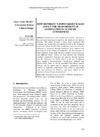Identificador persistente para citar o vincular este elemento:
https://accedacris.ulpgc.es/jspui/handle/10553/41881
| Campo DC | Valor | idioma |
|---|---|---|
| dc.contributor.author | Martín, Juan Carlos | en_US |
| dc.contributor.author | Román, Concepción | en_US |
| dc.contributor.author | Gonzaga, Clara | en_US |
| dc.date.accessioned | 2018-09-07T09:16:20Z | - |
| dc.date.available | 2018-09-07T09:16:20Z | - |
| dc.date.issued | 2018 | en_US |
| dc.identifier.issn | 1800-6450 | en_US |
| dc.identifier.uri | https://accedacris.ulpgc.es/handle/10553/41881 | - |
| dc.description.abstract | Satisfaction in the segment of academic conferences has not been analysed as much as the hotels in the field of tourism. This paper presents a fuzzy logic approach that evaluates the satisfaction of conferences held at the Technical University of Loja in 2013. The satisfaction experienced by the delegates is measured through triangular fuzzy numbers and the concept of the degree of optimality, via the closeness to ideal solutions. Using different fuzzy numbers representations, and different Likert scales, we test whether the obtained synthetic satisfaction indicators are affected. Results indicate that the indicators are highly robust to the use of different fuzzy numbers representations, clarification methods and Likert scales. Thus, it can be concluded that binary answer formats can be safely used to measure satisfaction in the context of academic conferences. This result is concordant with that obtained by Dolnicar and Grün (2007) in the analysis of brand image measurement. | en_US |
| dc.language | eng | en_US |
| dc.publisher | 1800-6450 | |
| dc.relation.ispartof | International Journal for Quality Research | en_US |
| dc.source | International Journal for Quality Research[ISSN 1800-6450],v. 12, p. 421-440 | en_US |
| dc.subject | 63 Sociología | en_US |
| dc.title | How different N-point likert scales affect the measurement of satisfaction in academic conferences | en_US |
| dc.type | info:eu-repo/semantics/Article | es |
| dc.type | Article | es |
| dc.identifier.doi | 10.18421/IJQR12.02-08 | |
| dc.identifier.scopus | 85049031238 | |
| dc.identifier.isi | 000435031900008 | - |
| dc.contributor.authorscopusid | 55727554800 | |
| dc.contributor.authorscopusid | 7102178538 | |
| dc.contributor.authorscopusid | 57190006882 | |
| dc.description.lastpage | 440 | - |
| dc.identifier.issue | 2 | - |
| dc.description.firstpage | 421 | - |
| dc.relation.volume | 12 | - |
| dc.investigacion | Ciencias Sociales y Jurídicas | en_US |
| dc.type2 | Artículo | en_US |
| dc.date.coverdate | Enero 2018 | |
| dc.identifier.ulpgc | Sí | es |
| dc.description.sjr | 0,204 | |
| dc.description.sjrq | Q4 | |
| dc.description.esci | ESCI | |
| dc.description.erihplus | ERIH PLUS | |
| item.grantfulltext | open | - |
| item.fulltext | Con texto completo | - |
| crisitem.author.dept | GIR TIDES: Investigación en Turismo y Transporte | - |
| crisitem.author.dept | IU de Turismo y Desarrollo Económico Sostenible | - |
| crisitem.author.dept | Departamento de Análisis Económico Aplicado | - |
| crisitem.author.dept | GIR TIDES: Investigación en Turismo y Transporte | - |
| crisitem.author.dept | IU de Turismo y Desarrollo Económico Sostenible | - |
| crisitem.author.dept | Departamento de Análisis Económico Aplicado | - |
| crisitem.author.orcid | 0000-0002-2950-2405 | - |
| crisitem.author.orcid | 0000-0002-0591-1298 | - |
| crisitem.author.parentorg | IU de Turismo y Desarrollo Económico Sostenible | - |
| crisitem.author.parentorg | IU de Turismo y Desarrollo Económico Sostenible | - |
| crisitem.author.fullName | Martín Hernández, Juan Carlos | - |
| crisitem.author.fullName | Román García, Concepción | - |
| Colección: | Artículos | |
Citas SCOPUSTM
9
actualizado el 08-jun-2025
Citas de WEB OF SCIENCETM
Citations
5
actualizado el 15-feb-2026
Visitas 1
1.081
actualizado el 27-jul-2024
Descargas
1.184
actualizado el 27-jul-2024
Google ScholarTM
Verifica
Altmetric
Comparte
Exporta metadatos
Los elementos en ULPGC accedaCRIS están protegidos por derechos de autor con todos los derechos reservados, a menos que se indique lo contrario.
